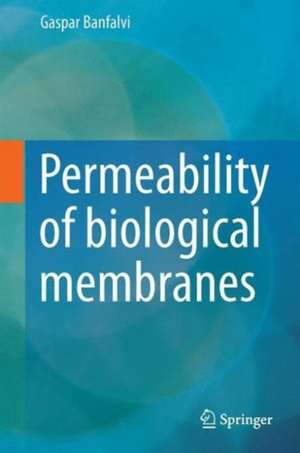Permeability of Biological Membranes
Autor Gaspar Banfalvien Limba Engleză Hardback – 19 feb 2016
Selectivepermeability of biological membranes also known as semipermeability, partialpermeability or differential permeability allows molecules to diffuse, pass bypassive and active or by other types of transport processes mediated byproteins.
The firstchapter of the book deals with the composition of biological membranes,characterizes cellular membranes of prokaryotic, eukaryotic cells, membranes ofcellular organelles and the function of biological membranes. The second chapter provides an overview of bilayerpermeability, selectivity of permeabilization and cellular transportprocesses. Chapter3 overviews different cell manipulations that aim to make cells permeable whilemaintaining not only the structural but also the functional integrity of cells.The last chapter deals with applications, particularly withreversible permeabilization to study macromolecular (DNA, RNA, poly-ADP ribose)biosynthetic processes, replication, gene expression, visualization ofreplicons, intermediates of chromosome condensation, genotoxic chromatinchanges, upon treatment with heavy metals and different types of irradiation.
The interdisciplinaryaspects of the book contribute to the understanding of the structure of nucleicacids, replicative intermediates, Okazaki fragments, RNA primer mechanism,subphases of replication and repair synthesis, replicons, gene expression,chromosome condensation generated a wealth of information that will attract awide readership. The natural audience engaged in DNA research, includinggenetics, cell and molecular biology, chemistry, biochemistry, medicine,pharmacy will find essential material in the book.
| Toate formatele și edițiile | Preț | Express |
|---|---|---|
| Paperback (1) | 558.06 lei 38-45 zile | |
| Springer International Publishing – 30 mar 2018 | 558.06 lei 38-45 zile | |
| Hardback (1) | 568.92 lei 38-45 zile | |
| Springer International Publishing – 19 feb 2016 | 568.92 lei 38-45 zile |
Preț: 568.92 lei
Preț vechi: 711.15 lei
-20% Nou
Puncte Express: 853
Preț estimativ în valută:
108.86€ • 113.66$ • 90.10£
108.86€ • 113.66$ • 90.10£
Carte tipărită la comandă
Livrare economică 31 martie-07 aprilie
Preluare comenzi: 021 569.72.76
Specificații
ISBN-13: 9783319280967
ISBN-10: 3319280961
Pagini: 263
Ilustrații: XI, 263 p. 94 illus., 42 illus. in color.
Dimensiuni: 155 x 235 mm
Ediția:1st ed. 2016
Editura: Springer International Publishing
Colecția Springer
Locul publicării:Cham, Switzerland
ISBN-10: 3319280961
Pagini: 263
Ilustrații: XI, 263 p. 94 illus., 42 illus. in color.
Dimensiuni: 155 x 235 mm
Ediția:1st ed. 2016
Editura: Springer International Publishing
Colecția Springer
Locul publicării:Cham, Switzerland
Public țintă
ResearchCuprins
Prelims.- Biological membranes.- Permeabilityof membranes.- Methodsof permeabilization.- Applicationsof permeabilization.- Index.
Textul de pe ultima copertă
This book deals with biologicalmembranes, focuses on permeabilization and pays particular attention toreversible permeabilization to maintain the viability and physiologicalconditions of the cells.
Selectivepermeability of biological membranes also known as semipermeability, partialpermeability or differential permeability allows molecules to diffuse, pass bypassive and active or by other types of transport processes mediated byproteins.
The firstchapter of the book deals with the composition of biological membranes,characterizes cellular membranes of prokaryotic, eukaryotic cells, membranes ofcellular organelles and the function of biological membranes. The secondchapter provides an overview of bilayer permeability, selectivity ofpermeabilization and cellular transport processes. Chapter 3 overviewsdifferent cell manipulations that aim to make cells permeable while maintainingnot only the structural but also the functional integrity of cells. The lastchapter deals with applications, particularly with reversible permeabilizationto study macromolecular (DNA, RNA, poly-ADP ribose) biosynthetic processes,replication, gene expression, visualization of replicons, intermediates ofchromosome condensation, genotoxic chromatin changes, upon treatment with heavymetals and different types of irradiation.
Theinterdisciplinary aspects of the book contribute to the understanding of thestructure of nucleic acids, replicative intermediates, Okazaki fragments, RNAprimer mechanism, subphases of replication and repair synthesis, replicons,gene expression, chromosome condensation generated a wealth of information thatwill attract a wide readership. The natural audience engaged in DNA research,including genetics, cell and molecular biology, chemistry, biochemistry,medicine, pharmacy will find essential material in the book.
Selectivepermeability of biological membranes also known as semipermeability, partialpermeability or differential permeability allows molecules to diffuse, pass bypassive and active or by other types of transport processes mediated byproteins.
The firstchapter of the book deals with the composition of biological membranes,characterizes cellular membranes of prokaryotic, eukaryotic cells, membranes ofcellular organelles and the function of biological membranes. The secondchapter provides an overview of bilayer permeability, selectivity ofpermeabilization and cellular transport processes. Chapter 3 overviewsdifferent cell manipulations that aim to make cells permeable while maintainingnot only the structural but also the functional integrity of cells. The lastchapter deals with applications, particularly with reversible permeabilizationto study macromolecular (DNA, RNA, poly-ADP ribose) biosynthetic processes,replication, gene expression, visualization of replicons, intermediates ofchromosome condensation, genotoxic chromatin changes, upon treatment with heavymetals and different types of irradiation.
Theinterdisciplinary aspects of the book contribute to the understanding of thestructure of nucleic acids, replicative intermediates, Okazaki fragments, RNAprimer mechanism, subphases of replication and repair synthesis, replicons,gene expression, chromosome condensation generated a wealth of information thatwill attract a wide readership. The natural audience engaged in DNA research,including genetics, cell and molecular biology, chemistry, biochemistry,medicine, pharmacy will find essential material in the book.
Caracteristici
New information on biological membranes is presented for readers from undergraduate to specialist Cell viabilitymaintained by reversal of permeabilization is a new aspect in membrane research Applications ofreversal of permeabilization serve as useful tools for future studies












